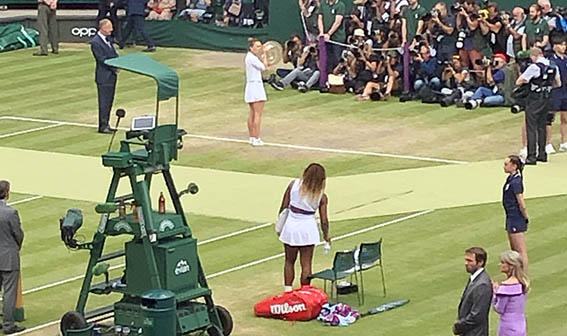John Ainley: Game, set and match for the inner game

I was lucky enough to be at Wimbledon for this year’s women’s singles finals between Serena Williams and Simona Halep; Williams, a 23 times grand slam winner and widely acknowledged as one of the greatest players of all time, playing Halep who, while no pushover as a former world number one, had only one grand slam title to her name.
Coming up against Williams, Halep confessed that she had always felt ‘intimidated’ by the seven times Wimbledon champion. But, those of us who saw the final would have been surprised that she felt anything but confident and in complete control as she swept away Williams’ challenge in less than an hour.
A pretty comprehensive victory for someone intimidated by her opponent, so how did she manage it?
After the match, Halep told the media: “I decided before the match that I’m going to focus on myself and on the final of grand slam, not on her. That’s why I was able to play my best, to be relaxed, and to be able to be positive and confident against her.”
Defeating self-doubt
There are many parallels here with the ‘inner game’ methodology that we use here at Alexander and which was pioneered, appropriately enough, by a tennis coach Timothy Gallwey who said: “The inner game is that which takes place in our mind and is played against such elusive opponents as nervousness, self-doubt and lapses of concentration. It is a game played by your mind against its own bad habits. Replacing one pattern of mental behaviour with a new, more positive one is the purpose of the inner game.”
I’ve talked about the inner game extensively in a previous post but I found it fascinating to see how Halep put into practice the idea that she wasn’t playing the occasion, or the reputation of Williams but simply played each ball and closed out all the noise around her. Even at match point, she kept that mentality: “I looked at the scoreboard. I said: ‘OK, it’s 5-2, it’s real.’ Then I just played every ball. I didn’t think about the score at all.”
It works in business
As I’ve said before, this shows how valuable the inner game can be not just to sports people but also to those in business who find themselves in situations where they might feel intimidated, nervous or simply unable to deliver their best. Being ‘present’ and closing out those negative mental states will lead to people achieving far more than they ever thought possible.
It worked for Halep against the might of Williams, so why not for that next Board presentation or big interview?
Game, set and match to the inner game.